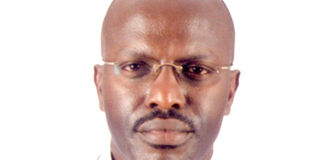State House Anti-Corruption Unit requires your support

Obed K. Katureebe
What you need to know:
- Give harsh sentences. Enact new laws that administer harsh sentences to those convicted of corruption. At the same time, government should endeavour to give fair remunerations to create no chance for those that are not criminal minded but are at times tempted to touch public till because they have no option but to risk.
As we ended 2019, President Yoweri Museveni created a special anti-corruption unit in State House headed by Lt Col Edith Nakalema. This unit, as the President clarified to Ugandans during his New Year message, is meant to reinforce the fight against corruption by supplementing other existing organs of government mandated to do similar responsibilities.
Nakalema’s unit has so far started work on a high note. Several arrests have been made pending prosecution and a number investigations are already underway. The unit so far is credited for being proactive and indeed very swift when they receive credible information regarding stealing of public resources.
Unlike the traditional anti-corruption agencies that are dodged by lethargy, bureaucratic procedures and compromise, Nakalema’s team is still insulated from those ills and our prayer is that they remain steadfast because corruption has indeed reared its ugly head in Uganda. Whereas the 10- Point Progamme that the 1986 NRM put out to achieve have almost all been achieved, but the saddest that threaten to undo those wonderful achievements is corruption.
The biggest challenge in combating corruption is our legal regime that makes it very difficult to rigorously apprehend those implicated in corruption. Currently, the process of apprehending those caught putting their hands in the public till is that it is so tedious and time consuming. Smart and wealthy thieves always outmanoeuvre the institutions meant to punish them and walk away free.
Whereas reforming the existing legal regime might take time, we need to support the Nakalema unit because it is robust and proactive. The naysayers are already viciously calling this unit all names and accusing the President of creating a parallel agency to duplicate what the Inspectorate of Government is doing. This is not true. This unit is meant to compliment the IG. This also calls for new approach to combat corruption by the traditional agencies mandated to do this. And these are the IGG, CID, DPP, the Anti-Corruption Court, the Auditor General, and the Attorney General. It cannot be business as usual if we are to combat corruption decisively.
The Judiciary has been on the spot for either abetting corruption or not doing enough to fight it. In a statement issued on October 26, Justice Catherine Bamugemereire, who is heading the Commission of Inquiry into Land Matters in the country, accused the Judiciary of corruption during the adjudication of land-related cases. Government has backed Justice Bamugemereire’s stance on corruption, saying allegations that graft engineered by the affluent, is eating away the Judiciary, could be true.
The Uganda Police Force, especially the Criminal Investigations Department, has not been spared either. There is little trust by members of the public that they handle their work minus getting compromised by the rich.
Cabinet has also debated and approved the zero-tolerance to corruption policy, 2018, which roots for, among other things, the need to strengthen and enforce existing anti-corruption policies. The objective of the zero-tolerance to corruption is to enable government renew its commitment to fight corruption by strengthening synergies, institute and effectively enforce anti-corruption measures. These are some of the suggestions that can improve the fight against corruption. They are indeed informed by some extensive research.
Government should create pathways that give citizens relevant tools to engage and participate in their governments – identify priorities, problems and find solutions. That is why all senior positions in governments such as the appointment of judges, permanent secretaries, service chiefs, etc, should involve public participation. This should provide information that should be used to verify if they merit assuming such positions. Anybody whose track record is tainted with corruption should never assume such responsible positions in government. And the right people to do the background check are the citizens.
Currently, the colonial rules of following public standing orders before a public officer is disciplined are so tedious and make it almost impossible to punish public servants that are involved in corruption. This has to change if we are to decisively deal with sleaze.
We have to invest in institutions and policy that are geared towards improving how a government delivers services and allow for change while making the best use of tested traditions and legacies – imported models often do not work.
We need to enact new laws that make all senior positions in government contractual. The business of permanent and pensionable must end after a certain rank in government. Renewal of the contract should be after a rigorous assessment of the scorecard. And any score below 70 per cent should be regarded as failure. The reason people steal with impunity or sleep on the job is because they know that their jobs are not under threat.
Bring together formal and informal processes (this means working with the government as well as non-governmental groups) to change behaviour and monitor progress.
Use the power of technology to build dynamic and continuous exchanges between key stakeholders - government, citizens, business, civil society groups, media, academia etc. Government and citizens interaction centre is the case in point.
Enact new laws that administer harsh sentences to those convicted of corruption. At the same time, government should endeavour to give fair remunerations to create no chance for those that are not criminal minded but are at times tempted to touch the public till because they have no option but to risk.
All the strategies suggested above should be continually monitored and evaluated to make sure that they are easily adapted as situations on the ground change.
Mr Katureebe works with Uganda Media Centre, Kampala




